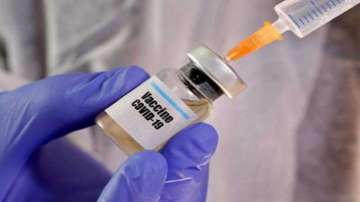Challenges ahead for Covid-19 vaccine distribution in India - Explained
Potential vaccine candidates across the world are in the race to become a reality against the highly-infectious coronavirus which has claimed innumerable lives around the globe so far. Recently, Pfizer and Modern released the results of clinical trials of their respective experimental coronavirus vaccines.

Potential vaccine candidates across the world are in the race to become a reality against the highly-infectious coronavirus which has claimed innumerable lives around the globe so far. Recently, Pfizer and Modern released the results of clinical trials of their respective experimental coronavirus vaccines. Both the candidates have reportedly shown an efficacy rate of over 90 per cent. Meanwhile, the first batch of Russia's Sputnik V vaccine for COVID-19 is expected to reach Kanpur's Ganesh Shankar Vidyarthi Medical College by next week wherein the vaccine's Phase 2 and Phase 3 human clinical trials will be conducted. The decision was taken after Dr Reddy Laboratories got approval from the Drugs Controller General of India (DCGI).
According to the Ministry of Health and Family Welfare data updated at 8 am Wednesday, the total coronavirus cases in the country have mounted to 89,12,907 with 38,617 infections being reported in a day while the death toll climbed to 1,30,993 with 474 new fatalities. The number of active cases remained below 5 lakh for the eighth consecutive day. There are 4,46,805 active cases of coronavirus infection in the country. The total recoveries have surged to 83,35,109 pushing the national recovery rate to 93.52 per cent while the COVID-19 case fatality rate stands at 1.47 per cent.
READ MORE: Storage of Pfizer's COVID-19 vaccine challenge for India
Now which potential vaccine is best for India? According to RDIF CEO Kirill Dmitriev, Sputnik-V coronavirus vaccine is safer than others. He said it is one of the three vaccines in the world backed by published preliminary clinical trial results. Russian President Vladimir Putin recently called for a joint effort by the BRICS nations on the development of the coronavirus vaccines as he suggested that Sputnik-V vaccine could be produced in India and China. Both India and China are members of the five-nation bloc.
Dmitriev said that the vaccine shows very high efficacy of 92 per cent. "The number is calculated very simply - 75 percent of clinical trial participants received the vaccine but only four out of 20 infected were administered Sputnik-V while the remaining 16 were on placebo," he said.
He also cited a poll conducted by the RDIF that revealed about 60 per cent of people across India know about Russia's vaccine.
On the other hand, clinical trial results of Moderna and Pfizer have also shown promising results. Reports say that Moderna's study was small but enough to draw a statistical conclusion. But researchers still need to know that for how long the immune response will be effective.
Another factor is the cost of Moderna and Pfizer in India. It is believed that these two would be more expensive than others.
Reports say that AstraZeneca and the University of Oxford's coronavirus vaccine could be the first to be made available in India by the first quarter of 2021. But the country needs additional cold storage facilities for the distribution of a coronavirus vaccine. Also, the cold-chain requirement for the anti-coronavirus vaccine candidate developed by Pfizer at a temperature of minus 70 degrees Celsius poses a big challenge. The government has said that it examining the possibilities if at all the vaccine has to be obtained by India.
The main challenge would be related to the distribution. India produces more vaccines than any country but it lacks a delivery system, specially for adults apart from pregnant women.
NITI Aayog member (Health) Dr VK Paul, who also heads the National Task Force on COVID-19, said sufficient doses of the vaccine, as required for the Indian population, will not be available, but the government is looking at the possibilities and will work out a strategy for its procurement and distribution in case it gets the regulatory approvals.
It would be a challenging task for the government to put in place a strategy to ensure vaccine reaches every nook and corner of the country. The country may need repeated waves of vaccination based on priority groups and it could take at least two years for all Indians to receive doses.
Notably, Prime Minister Narendra Modi has already assured citizens that everyone in the country will be inoculated once a vaccine for the highly-infectious coronavirus becomes available. According to him, a digital platform was being prepared to enroll, track and reach the beneficiaries. He has suggested developing a vaccine delivery system that is on the lines of how elections are conducted in the country.